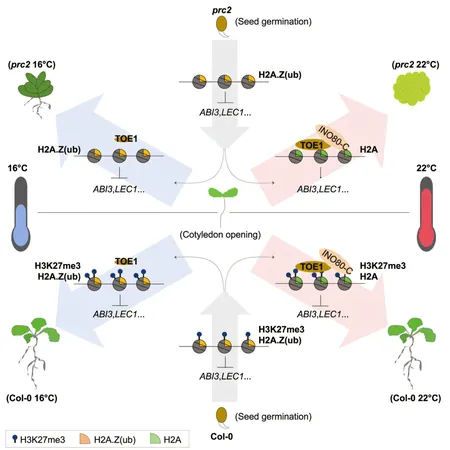
How Temperature Changes Shape the Future of Plant Cells: New Discoveries in Epigenetic Control
2025-04-28
Author: John Tan
Breakthrough Research Reveals Nature’s Temperature Influence on Plant Cells
In a stunning new discovery, a research team led by Prof. Xiao Jun at the Institute of Genetics and Developmental Biology of the Chinese Academy of Sciences has unveiled how temperature dramatically affects plant cell fate through epigenetic reprogramming. Published in *Developmental Cell*, their findings reveal groundbreaking mechanisms showing that temperature is not just a passive environmental factor but an active player in genetic expression.
The Dance of Heat and Genes: How Plants Adapt
The study shines a light on the process in the model plant *Arabidopsis thaliana*, where temperature influences the transition from seed to seedling. Here, a critical group of genes required only during embryonic development must be silenced for the plant to thrive in its next phase of growth.
Inside the Cellular Machinery: The Role of PRC Complexes
To achieve this, plants utilize two powerful protein complexes, PRC1 and PRC2, that play a crucial role in silencing gene activity. These complexes modify chromatin structure by adding chemical signals that essentially 'lock' embryonic genes, preventing them from being activated post-germination.
The Epic Battle of Temperature and Genetic Expression
Interestingly, the research revealed that cooler temperatures (around 16°C) can counterbalance the loss of PRC2 in mutant plants. This clever adaptation could salvage developmental processes otherwise hampered by genetic dysfunction, highlighting the resilience of plant cells.
TOE1: The Temperature Guardian of Gene Regulation
The transcriptomic and genetic analyses conducted by the researchers pinpointed the transcription factor TOE1 as an essential mediator in this temperature response. Under typical conditions, TOE1 works to remove a specific histone variant, H2A.Z, to facilitate normal growth transitions. However, cooler temps hamper TOE1’s function, leading to the accumulation of H2A.Z and the altered interaction with PRC1, which then takes over in silencing embryonic genes.
Major Implications for Agriculture and Medicine
This research not only opens the door to optimizing crop regeneration by tweaking culture temperatures but also suggests profound implications for our understanding of multicellular differentiation. The conserved epigenetic marker, H3K27me3, plays similar roles across both plants and animals, managing developmental plasticity and adaptability in unique yet comparative ways.
A Potential Connection to Cancer Treatment
The insights drawn from this study could even extend beyond agriculture, presenting new avenues for cancer research. Dysregulation of H3K27me3 in humans is linked to cancer, where genes can regain stem-like properties, surprisingly akin to how plants form calluses.
In conclusion, this research reveals profound insights into the fluidity of plant genomes, shedding light on their capacity to respond to environmental changes through epigenetic reprogramming. The future of plant biology and our approach to medicine may never be the same.



 Brasil (PT)
Brasil (PT)
 Canada (EN)
Canada (EN)
 Chile (ES)
Chile (ES)
 Česko (CS)
Česko (CS)
 대한민국 (KO)
대한민국 (KO)
 España (ES)
España (ES)
 France (FR)
France (FR)
 Hong Kong (EN)
Hong Kong (EN)
 Italia (IT)
Italia (IT)
 日本 (JA)
日本 (JA)
 Magyarország (HU)
Magyarország (HU)
 Norge (NO)
Norge (NO)
 Polska (PL)
Polska (PL)
 Schweiz (DE)
Schweiz (DE)
 Singapore (EN)
Singapore (EN)
 Sverige (SV)
Sverige (SV)
 Suomi (FI)
Suomi (FI)
 Türkiye (TR)
Türkiye (TR)
 الإمارات العربية المتحدة (AR)
الإمارات العربية المتحدة (AR)